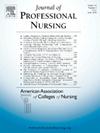An integrative literature review for the clinical expert transitioning to a nurse faculty role
IF 2.9
3区 医学
Q1 NURSING
引用次数: 0
Abstract
Background
Clinical experts with graduate academic credentials are a solution to registered nurse shortages in nursing education globally. However, expert clinician roles are without translation in academic appointments.
Purpose
Explore published evidence in an integrated literature review, identifying the categories for successful transitions from expert clinician to novice nurse faculty.
Design & method
The design is an integrative literature review of citation databases, organizations, and grey literature. Authors used search terms, nurse educat*, novice nurse educat*, mentor*, academ*, and transition to academic position. Inclusion criteria were 2018–24, English only, and peer-reviewed. The authors used Covidence™ PRISMA for analysis. Four electronic data sources were searched, including the Cumulative Index to Nursing & Allied Health Literature (CINAHL), PubMed, Scopus, and Google Scholar. The authors used grey literature, organizations' websites, and citation lists of articles.
Results
Analysis of 36 relevant peer-reviewed articles, four organizational websites and grey literature resulted in the identification of five categories (Faculty Introduction to Academia, Pedagogical Approaches, Academic Freedom in Education, Academic Complexity, and Teaching Philosophy and Goals) with sub-category sources. Organizational sites contributed to knowledge about academic hierarchy, learning theories, pedagogical application to curriculum, alignment to national standards, technological skills development, and other attitudes and skills. Authors identified gaps with recommendations.
Conclusions
The study organizes published evidence to support graduate-prepared expert clinician novice faculty learning and competence essential following an academic appointment, suggesting ©Boutique Mentoring as a personal method to promote self-reflection and skill building for smooth transition in and maintenance of benchmarks in academic faculty roles.
临床专家过渡到护士教师角色的综合文献综述
具有研究生学历的临床专家是全球护理教育中注册护士短缺的解决方案。然而,在学术任命中,专家临床医生的角色是没有翻译的。目的在综合文献综述中探索已发表的证据,确定从专家临床医生到新手护士教师成功转变的类别。设计,方法对引文数据库、组织和灰色文献进行综合文献综述。作者使用的搜索词是:护士教育*、新手护士教育*、导师*、学术*和向学术职位过渡。纳入标准为2018-24年,仅限英语,并经过同行评审。作者使用covid - ence™PRISMA进行分析。检索了四个电子数据源,包括护理累积指数;联合健康文献(CINAHL)、PubMed、Scopus和谷歌Scholar。作者使用灰色文献、组织网站和文章引用列表。结果通过对36篇相关同行评议文章、4个组织网站和灰色文献的分析,确定了5个类别(教师学术介绍、教学方法、教育中的学术自由、学术复杂性和教学理念与目标)的子类别来源。组织网站有助于了解学术等级、学习理论、课程教学应用、与国家标准的一致性、技术技能发展以及其他态度和技能。作者通过建议确定了差距。该研究整理了已发表的证据,以支持研究生准备的专家临床医生新手教师在学术任命后的学习和能力,建议©精品指导作为一种个人方法,促进自我反思和技能建设,以顺利过渡和维护学术教师角色的基准。
本文章由计算机程序翻译,如有差异,请以英文原文为准。
求助全文
约1分钟内获得全文
求助全文
来源期刊
CiteScore
4.80
自引率
8.00%
发文量
153
审稿时长
52 days
期刊介绍:
The Journal will accept articles that focus on baccalaureate and higher degree nursing education, educational research, policy related to education, and education and practice partnerships. Reports of original work, research, reviews, insightful descriptions, and policy papers focusing on baccalaureate and graduate nursing education will be published.

 求助内容:
求助内容: 应助结果提醒方式:
应助结果提醒方式:


